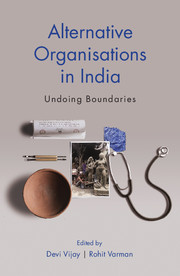Book contents
- Frontmatter
- Dedication
- Contents
- List of Tables and Figures
- Acknowledgements
- Chapter 1 Introduction: Undoing Boundaries
- Chapter 2 Formal and Informal Technologies of Alternative Organisational Spaces within the State: An Analysis of Violence, Wrongdoing and Policing
- Chapter 3 Scripting Alternative Images: Institutions, Practices and Scripts of the Mritshilpis of Kumortuli
- Chapter 4 Shelter for Homeless: Ethnography of Invisibility and Self-exclusion
- Chapter 5 Alternative Spaces of Employment Generation in India: Informal Rules, Structures, and Conflicting Organisational Requirements
- Chapter 6 Shaheed Hospital: Alternative Organisation, Ideology and Social Movement
- Chapter 7 Acting for Change: A Circuits of Power Analysis of a Denotified Nomadic Tribe and Budhan Theater's Struggle for Change
- Chapter 8 Swaraj: An Alternative University
- Chapter 9 Alternative Organisations: Spaces for Contestation
- Contributors
- Index
Chapter 7 - Acting for Change: A Circuits of Power Analysis of a Denotified Nomadic Tribe and Budhan Theater's Struggle for Change
Published online by Cambridge University Press: 05 April 2018
- Frontmatter
- Dedication
- Contents
- List of Tables and Figures
- Acknowledgements
- Chapter 1 Introduction: Undoing Boundaries
- Chapter 2 Formal and Informal Technologies of Alternative Organisational Spaces within the State: An Analysis of Violence, Wrongdoing and Policing
- Chapter 3 Scripting Alternative Images: Institutions, Practices and Scripts of the Mritshilpis of Kumortuli
- Chapter 4 Shelter for Homeless: Ethnography of Invisibility and Self-exclusion
- Chapter 5 Alternative Spaces of Employment Generation in India: Informal Rules, Structures, and Conflicting Organisational Requirements
- Chapter 6 Shaheed Hospital: Alternative Organisation, Ideology and Social Movement
- Chapter 7 Acting for Change: A Circuits of Power Analysis of a Denotified Nomadic Tribe and Budhan Theater's Struggle for Change
- Chapter 8 Swaraj: An Alternative University
- Chapter 9 Alternative Organisations: Spaces for Contestation
- Contributors
- Index
Summary
We arrive in an auto-rickshaw; on its three wheels it is far more capable of plying the single narrow road in Chharanagar than a car. It is our first visit and we end up missing the library altogether, instead getting off at a railway crossing at the end of the road, from where we are escorted backwards on foot. We are later told that years ago, renowned writer-activist Mahasweta Devi and noted literary critic and activist G. N. Devy had stood at the same railway crossing when they came to meet the Chharas – a criminalised tribal community that lives in Ahmedabad, Gujarat, India. That particular meeting had heralded the possibility of a different future for the community.
We sit in the library, and over the next two days hear from the Chharas about their history, their circumstances and their recent efforts to change those circumstances. We are taken around Chharanagar as well: while there is only a single road, there are many narrow lanes, accessible only to feet and bicycles, where an entire community lives. Discouraging as the sights of the community's living conditions are, however, it is not in their poverty that the tragedy of their plight lies – such poverty is quite common in this country. What really ails the Chhara community is their powerlessness, their inability to change their plight because the label of ‘born criminals’ given to them by the British a century ago has stuck on even generations after independence, carrying with it all the social stigma and oppression that it carried then and perhaps more. The stigma denies most opportunities even to those few Chharas who possess some economic capital; for the large majority born without wealth, it is the ocean that separates them from the aspiring youth of modern India.
Our aim in this chapter is to describe the story of the Chharas as they have told it to us, as well as analyse their situation, and their attempts to change it, through theories of power. Specifically, we employ Clegg's (1989) framework of the circuits of power that comprises three different circuits – the episodic, the dispositional and the facilitative – that operate in an interconnected manner to create distributions of power.
- Type
- Chapter
- Information
- Alternative Organisations in IndiaUndoing Boundaries, pp. 183 - 204Publisher: Cambridge University PressPrint publication year: 2017

